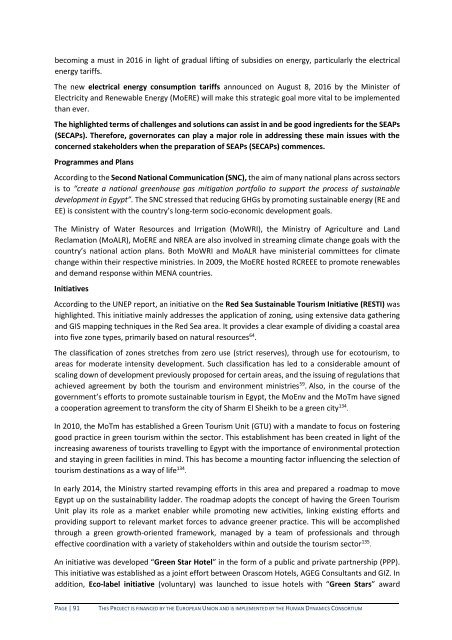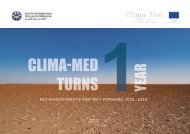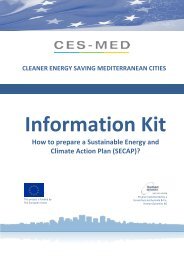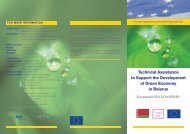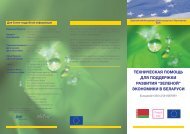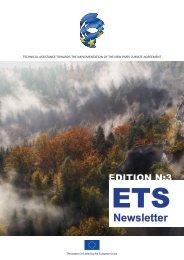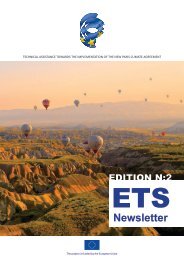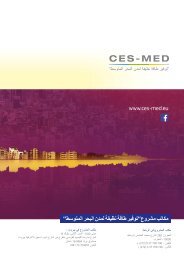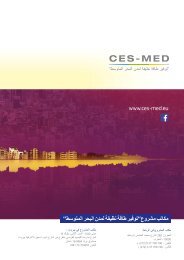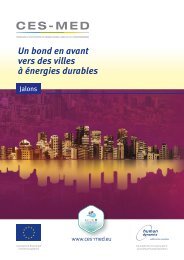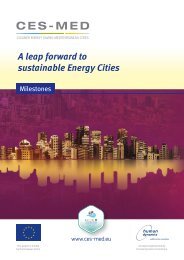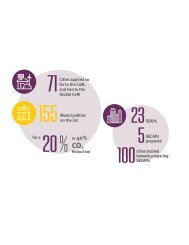180917_CES-MED_National_Report_Egypt_FINAL2rev
Create successful ePaper yourself
Turn your PDF publications into a flip-book with our unique Google optimized e-Paper software.
ecoming a must in 2016 in light of gradual lifting of subsidies on energy, particularly the electrical<br />
energy tariffs.<br />
The new electrical energy consumption tariffs announced on August 8, 2016 by the Minister of<br />
Electricity and Renewable Energy (MoERE) will make this strategic goal more vital to be implemented<br />
than ever.<br />
The highlighted terms of challenges and solutions can assist in and be good ingredients for the SEAPs<br />
(SECAPs). Therefore, governorates can play a major role in addressing these main issues with the<br />
concerned stakeholders when the preparation of SEAPs (SECAPs) commences.<br />
Programmes and Plans<br />
According to the Second <strong>National</strong> Communication (SNC), the aim of many national plans across sectors<br />
is to “create a national greenhouse gas mitigation portfolio to support the process of sustainable<br />
development in <strong>Egypt</strong>”. The SNC stressed that reducing GHGs by promoting sustainable energy (RE and<br />
EE) is consistent with the country’s long-term socio-economic development goals.<br />
The Ministry of Water Resources and Irrigation (MoWRI), the Ministry of Agriculture and Land<br />
Reclamation (MoALR), MoERE and NREA are also involved in streaming climate change goals with the<br />
country’s national action plans. Both MoWRI and MoALR have ministerial committees for climate<br />
change within their respective ministries. In 2009, the MoERE hosted RCREEE to promote renewables<br />
and demand response within MENA countries.<br />
Initiatives<br />
According to the UNEP report, an initiative on the Red Sea Sustainable Tourism Initiative (RESTI) was<br />
highlighted. This initiative mainly addresses the application of zoning, using extensive data gathering<br />
and GIS mapping techniques in the Red Sea area. It provides a clear example of dividing a coastal area<br />
into five zone types, primarily based on natural resources 64 .<br />
The classification of zones stretches from zero use (strict reserves), through use for ecotourism, to<br />
areas for moderate intensity development. Such classification has led to a considerable amount of<br />
scaling down of development previously proposed for certain areas, and the issuing of regulations that<br />
achieved agreement by both the tourism and environment ministries 59 . Also, in the course of the<br />
government’s efforts to promote sustainable tourism in <strong>Egypt</strong>, the MoEnv and the MoTm have signed<br />
a cooperation agreement to transform the city of Sharm El Sheikh to be a green city 134 .<br />
In 2010, the MoTm has established a Green Tourism Unit (GTU) with a mandate to focus on fostering<br />
good practice in green tourism within the sector. This establishment has been created in light of the<br />
increasing awareness of tourists travelling to <strong>Egypt</strong> with the importance of environmental protection<br />
and staying in green facilities in mind. This has become a mounting factor influencing the selection of<br />
tourism destinations as a way of life 134 .<br />
In early 2014, the Ministry started revamping efforts in this area and prepared a roadmap to move<br />
<strong>Egypt</strong> up on the sustainability ladder. The roadmap adopts the concept of having the Green Tourism<br />
Unit play its role as a market enabler while promoting new activities, linking existing efforts and<br />
providing support to relevant market forces to advance greener practice. This will be accomplished<br />
through a green growth-oriented framework, managed by a team of professionals and through<br />
effective coordination with a variety of stakeholders within and outside the tourism sector 135 .<br />
An initiative was developed “Green Star Hotel” in the form of a public and private partnership (PPP).<br />
This initiative was established as a joint effort between Orascom Hotels, AGEG Consultants and GIZ. In<br />
addition, Eco-label initiative (voluntary) was launched to issue hotels with “Green Stars” award<br />
PAGE | 91<br />
THIS PROJECT IS FINANCED BY THE EUROPEAN UNION AND IS IMPLEMENTED BY THE HUMAN DYNAMICS CONSORTIUM


